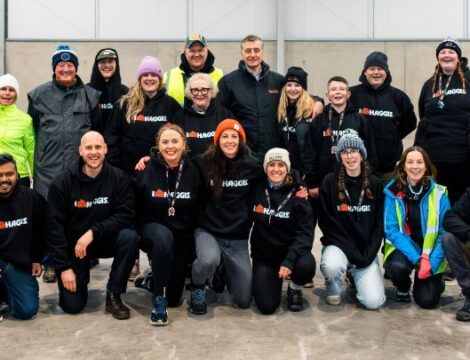Simon Howie and his fellow directors at the business are relieved and delighted with the decision taken by the planning committee of Perth and Kinross Council (PKC) to approve our request to install a 2.3MW turbine at Findony Farm Dunning, at the recent meeting on 13th March 2024.
A vote of 11 votes to 2 was recorded after a strong and detailed recommendation for approval from the PKC Local Application team leader, Paul Williamson.
Simon Howie spoke at the meeting in person and was supported by Rob Collin and Rachael Lyall from Environment Consultants, Greencat Renewables Ltd.
The elected members heard from local Dunning Community Councilor Colin Young, along with a local resident who lived nearby. Comments relating to the potential detriment to visual amenities plus shadow flicker and excessive noise were made. The members challenged Mr Young on the fact that renewable energy is an important element of reducing carbon emissions in an effort to achieve Net zero and that in the case of one member, Councillor Bob Brawn (Blairgowrie and Glens ward), there are, he explained, numerous turbines in his ward, and “they just blend in as part of the furniture of life”
Simon Howie addressed the members with a full breakdown of the journey that the business is on to become the country’s only food processing business which has the potential of running “off grid”. He explained that for over 10 years there has been no use of mains water or outfall from the factory as this is a closed-loop system where it comes from and goes back to land via a wetland ecological pond system. This set the business to explore how mains electricity and gas could be reduced or eradicated altogether. 150Kw of solar panels were installed in 2013 so the step up to 2.1Mw of solar and 900Kw of battery back-up was installed in 2023. Mr Howie went on to describe how the missing link or “icing on the cake” was the ability to generate power in the poor (solar) months from November to March, thus the idea of adding a wind turbine to the system. “Our site is not optimal for wind and in fact it is only due to having the solar and battery systems in place that make a large machine viable, therefore a Turbine alone would not have solved our issue. We hope to be spilling more onto the grid than we consume in due course” An agreement with SSE to allow a 2mW grid connection means the future expansion of the business can happen, and crucially any excess green power can be made available to the national grid at all times.
Coupled with a Lithium battery the business has installed two large 15000-litre water tanks which are heated by electricity thus displacing over 75% of the gas required to heat the water. 30,000 litres per day is required for wash down and cleaning of the factory and equipment, all of which is currently heated by Gas.
Simon Howie thanked the members for their informed questions and commented that Perth and Kinross is to be commended for not only talking positively about supporting companies to achieve net zero and reduce their carbon usage, but by backing this up by allowing what can often be seen as controversial applications be passed at committee level rather than being refused and directed to the Government reporters office. “Too many times, we have seen strong recommendations, from planning officers in the councils, then a well-organised group of objectors sway the councilors on the day and they take the safer option and go against their own policies by refusing the application” said Simon Howie
Wind turbines are the marmite of renewables. A recent Scottish Government official who visited Simon Howie’s factory was at pains to explain that she looks forward to the day when every factory has a mix of Wind, Solar and battery power which in turn will allow a far lesser dependence of grid power and insulate businesses from the variable world of fluctuations in power prices.
During his presentation, Simon Howie conveyed his dismay that, for the past 20 years, all UK businesses have been paying Climate Change levies to subsidise the uptake in renewable power generation, which has been a considerable cost and redistribution of wealth over this period, nevertheless the effects of the Ukraine war were immediately felt with an increase of gas and electricity costs equating to 7 -10 times the pre Ukraine levels. This felt like profiteering from the big generators therefore the decision to couple the net zero ambition with an insulation against further price hikes was made. Until such times as the generation of power is in many, rather than a few, hands we will be at the mercy of world events and will not be able to forecast, with any certainty, the levels of our future energy costs. Supply and demand is one of the most important business dynamics, with the bulk of our business decisions coming from this. We must have an oversupply of energy and ensure it is not corralled into large conglomerate’s hands.
Aside from the financial and carbon reduction upsides, the business will make its supermarket customers aware of the new initiatives which will also include the ability to recharge delivery and staff vehicles as well as giving them the green credentials they require in order to satisfy their shoppers that upward pressure is being put on manufacturers to do something about the climate emergency.





 Explore Articles
Explore Articles
 Click & Collect
Click & Collect













